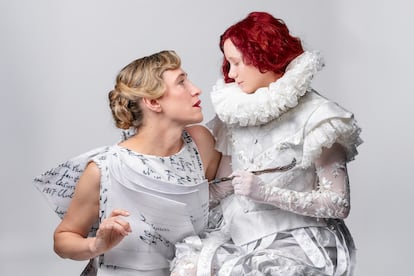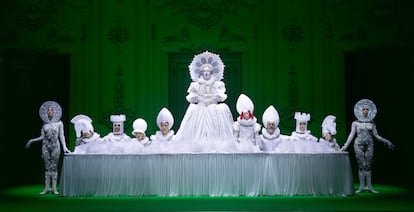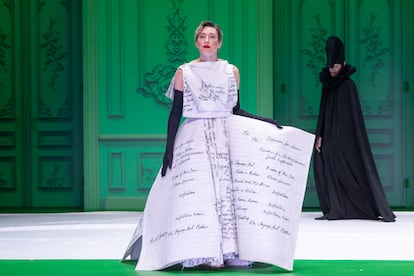Abril Zamora: “Right now, it’s my obligation to wear the ‘trans’ label.”

April Zamora (Cerdanyola del Vallès, Barcelona, 43) began working in the advertising world at 16, but even then dreamed of making it big in the theater. She has just achieved this with Orlando , the theatrical adaptation of Virginia Woolf's novel directed by Marta Pazos at the Centro Dramático Nacional. The play, running at the María Guerrero until June 8, has become a critical and popular success. "I came to Madrid when I was 21 for this," says Zamora, who in this production plays Woolf and is responsible for narrating the transition of Orlando, an attractive aristocrat who goes to bed one day and wakes up the next morning magically transformed into a woman.
"I haven't done theater since my transition; this is my first female role in theater," the actress admits. She will return to the stage in September in a revival of the musical Cabaret. at the Albéniz Theater in the capital, alongside the Letsgo company. There, he will play Emcee, the master of ceremonies at the Kit Kat Club.
Question: Have you already read Orlando ?
Answer: No, I hadn't read anything by Virginia Woolf . At first, Orlando seemed like a bore to me. But little by little, I got into the story and found a lot of connections. I was thrilled and fell in love with it. I would have done the show anyway, even if I wouldn't have liked it, because we don't have the kind of choice.
Q. Did you have to audition to get this role?
A. Marta [Pazos] called me directly and offered it to me. I would have jumped right into any role in the play. I come from the theater world, but I hadn't worked in theater for many years.
P. Virginia Woolf was a very free woman, but also very tormented. Were you able to connect with that?
A. I think there's something deeply tormented about all of us who work in the art world, but I don't think you have to dig too deep to see that right now, everyone feels a little tormented. It's very difficult to live in this time, in this capitalist system where we simply work to pay extremely high rents, to be able to do nothing, and to come home exhausted. We have little free time because all we do is work and try to rest. How can we not empathize with that storm that Virginia Woolf felt ? It's very easy to empathize with her.
Q. It's very easy to end up in a river, with a shelter full of stones.
A. It's very easy. Not in a literal sense, but sometimes it's really hard. I like to show the beautiful side of things because wonderful things happen to me, and others are responsible for showing us all the terrifying things that are happening in the world. But, love, sometimes it's really hard.
Q. Where do you find refuge from this hostile world?
A. In simple, mundane things like taking my dogs for a walk; meeting up with people I haven't seen in a long time; rewatching the movies that shaped my adolescence; or just not being social. I love not being social and hiding in my house.

P. Orlando , written in 1928, speaks of feminism, gender freedom, and identity… Almost a hundred years later, we are still discussing the same issues.
A. We're discussing them more than ever. Worse than that, we're going backwards . One of the things I like most about the play is when Orlando, now a woman, looks in the mirror and says something like, "Nothing is different, only sex." It's wonderful how Virginia Woolf explains change so simply. I wish it would happen like that sooner or later, that we wouldn't give these things so much importance. I get tired of always being labeled "trans," but we're at a point where, unfortunately, we have to talk about this.
P. In fact, there are many trans women who don't want to carry that label.
A. No, I do. Right now , it's my obligation to carry the "trans" label . I hope there comes a time when it won't matter. But we're at a time, love, when suddenly they break your arms or legs or throw you into a river. It's necessary to carry the label, especially so that the new generations can project themselves onto other people, to remove all the darkness they're trying to cast on us.
P. But it's also a burden.
A: I'm bored, love. Imagine being a redhead and everyone only talking to you about redhead things. It annoys me that I'm always labeled "trans," but I realize that it's very necessary now. A few days ago, leaving a performance of Orlando , some kids passing by the theater insulted me. That's something that happens normally. You often pretend it doesn't affect you, but of course it does. That day I told Marta, the director, "How necessary a play like this is right now and in a public theater."
Q. The big trap is that they tell us that everything has already been achieved.
A. But it's not true. I experience it myself every day. Those who say everything has been achieved speak from a position of privilege.
Q. In the play, you strip completely naked. Was it difficult?
A. I have my insecurities, but when you make a pact of honesty with a director like Marta, and in a show like this, you give it your all. Before going on stage, a thousand things go through my head, but I think in the play we talk a lot about the revolution of the body, and it's wonderful and necessary to see all kinds of bodies, normative and non-normative. In the end, we're all the same jumble of bodies. Does it creep me out? Yes. But it also creeps me out about exposing myself with clothes on. What would you have done?
P. I would have lost the role because I am very shy.
R. [Laughs] Honey, we only have one life. I'm telling you the truth.

Q. When Orlando wakes up as a woman, he discovers that other things are expected of him. He's expected to be submissive, gentle... Do you feel that's still expected of women?
A. Of course I feel that way. I'm surrounded by women who fight against these kinds of concepts. We all fight every day and ask ourselves questions like: Why do I psychologically abuse myself by thinking I'm not good enough or pretty enough? Why do I have imposter syndrome pulling the reins so often? I've been ingrained in this narrative that I have to be a certain way to fit in, and I'm constantly trying to unravel these issues so I can live differently. All of this brings us to the importance of role models.
P. Orlando was banned during the Franco regime. Vox censored a performance in Valdemorillo in 2023. Why does this story continue to make some people uncomfortable?
A. Because it speaks frankly about gender and feminism, and because there are still people who don't want change. I find it terrifying that things continue to be censored. Theater, film, and television are the only windows many people have to discover other worlds or to understand themselves. Closing those windows is trying to force people to live in ignorance.
P. He became very popular as Professor in the latest edition of Operación Triunfo . Do you feel that your time on OT may have overshadowed your career?
A. Not at all. It's true that Operación Triunfo has been a huge success, but with a very specific audience, a younger audience than me. For me, it's been a super positive experience, and I'm very proud of the lessons learned.
Q. Are you going to repeat in the next edition?
R. Love, I don't know if I can answer that [laughs].

Q. Are you very critical of yourself?
A. A lot. Now I'm learning to pat myself on the back when I think I'm doing things right. If I've been given this opportunity, maybe I'm doing something right. I've always felt like I'm the worst actress in the world. I always think I'm not good enough or that I'm not doing things well enough and that I'm taking up space I don't deserve. You see? In the end, we always come back to imposter syndrome.
EL PAÍS





%3Aformat(jpg)%3Aquality(99)%3Awatermark(f.elconfidencial.com%2Ffile%2Fbae%2Feea%2Ffde%2Fbaeeeafde1b3229287b0c008f7602058.png%2C0%2C275%2C1)%2Ff.elconfidencial.com%2Foriginal%2F506%2Fd3b%2F97a%2F506d3b97a8e329fb7355504e1060218f.jpg&w=3840&q=100)